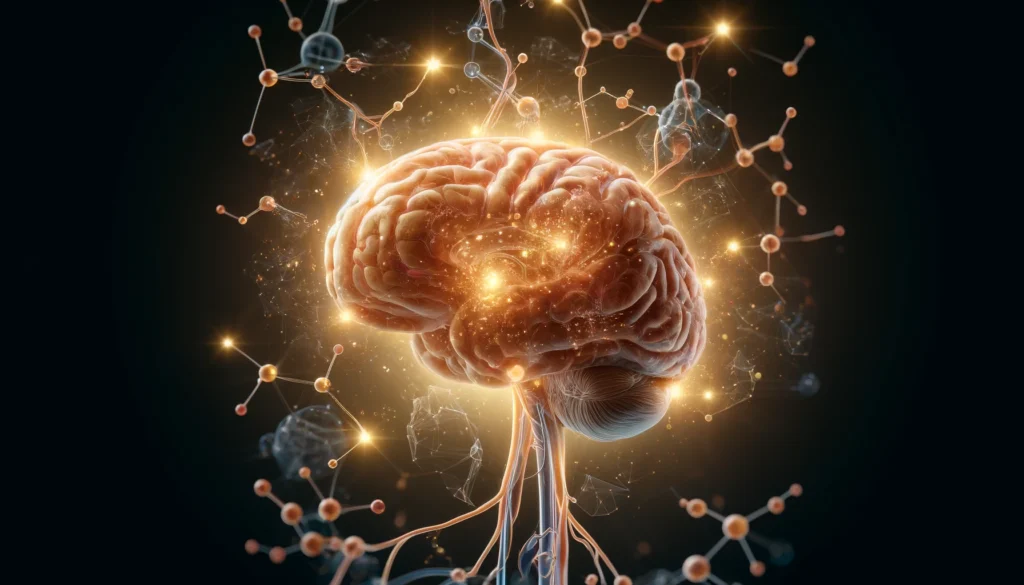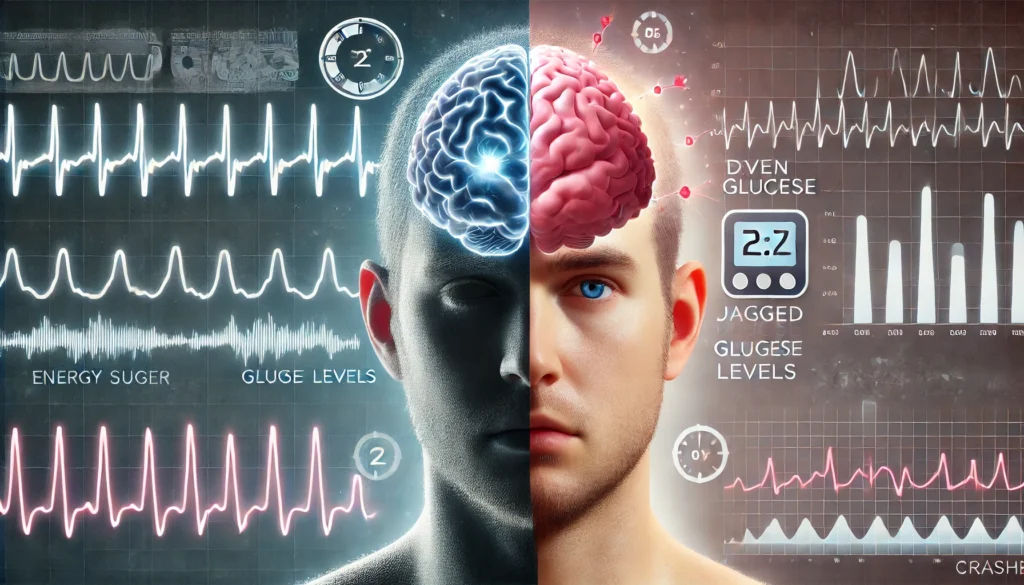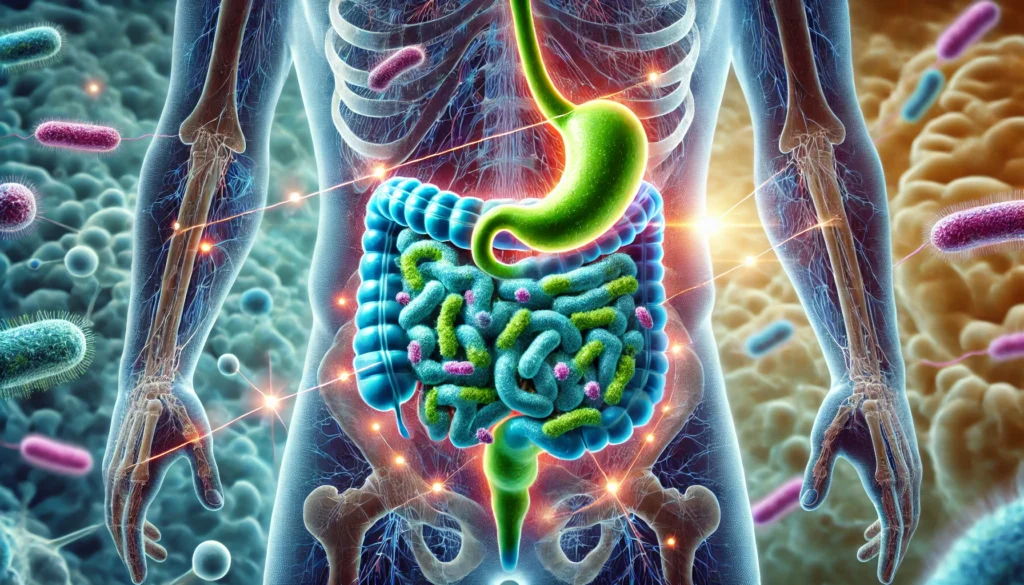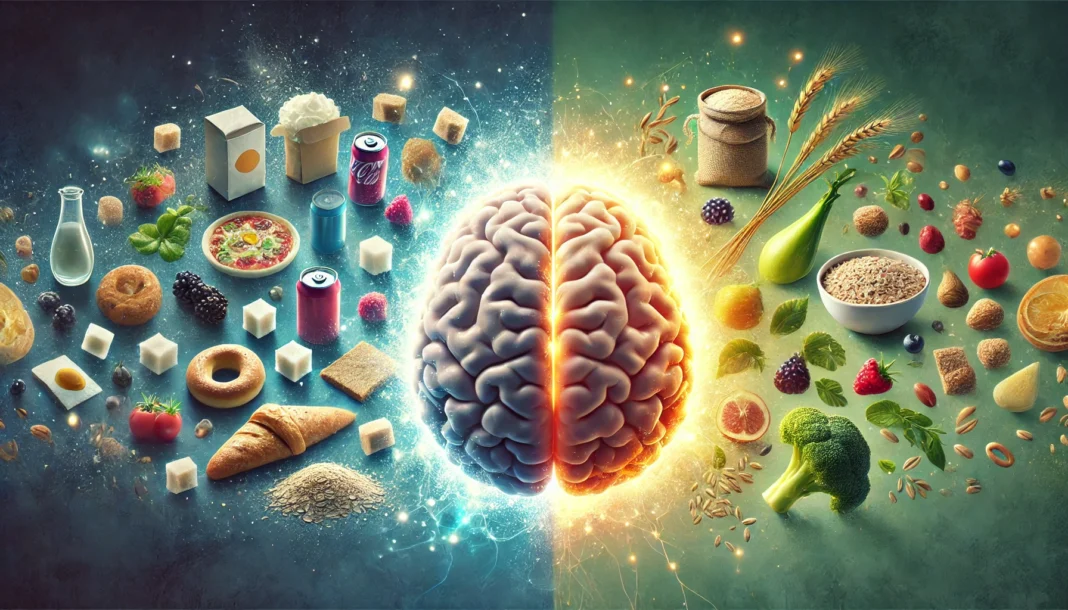Introduction
Brain fog has emerged as a common complaint among individuals navigating modern lifestyles, especially those juggling work, stress, and erratic eating patterns. Described by sufferers as a cloudy, sluggish mental state, brain fog affects attention, memory, processing speed, and overall mental clarity. While many potential contributors have been discussed in scientific literature—from sleep deprivation to hormonal shifts and chronic stress—growing attention has turned toward the role of diet. Specifically, the question arises: do carbs cause brain fog?
You may also like: MCT Oil for Dementia and Brain Health: Exploring Its Role in Memory, Function, and Alzheimer’s Support
Carbohydrates, long considered the body’s primary energy source, are now under scrutiny in nutrition science not just for their effects on weight and blood sugar, but also for their influence on brain function. Many individuals report experiencing a noticeable dip in cognitive sharpness after high-carbohydrate meals. The connection between carbs and brain fog is not just anecdotal—it’s becoming an active area of research across neurology, endocrinology, and nutritional science.
Understanding this relationship requires more than broad dietary assumptions. It involves examining how different types of carbohydrates affect blood glucose, insulin signaling, gut health, neurotransmitter balance, and inflammation—factors that are intimately tied to cognitive performance. Additionally, lifestyle factors, such as timing of meals, type of carbohydrate consumed, and individual metabolic health, can dramatically influence how the brain responds.
This article dives deep into the scientific evidence behind carbs and cognitive clarity. It explores whether carbs truly cause brain fog, which types of carbs are most problematic, how the brain responds to dietary glucose, and what interventions may support mental clarity without sacrificing nutritional balance. Whether you are battling midday mental crashes or simply curious about optimizing brain function through diet, this investigation provides clarity through evidence, not myths.

The Brain’s Relationship with Carbohydrates
Carbohydrates are the preferred energy source for the brain. Glucose, the simple sugar derived from carbohydrate digestion, fuels essential cognitive operations, from attention regulation to memory recall. In fact, the brain accounts for about 20% of the body’s total glucose utilization, despite comprising only 2% of body weight.
However, not all carbohydrates act the same way. Simple carbohydrates like white bread, pastries, and sugary snacks are rapidly digested, leading to swift glucose spikes in the bloodstream. This sudden influx of sugar can cause an overstimulation of insulin—the hormone that helps cells absorb glucose. As insulin rapidly removes sugar from the blood, a person may experience a subsequent drop in blood glucose levels, a phenomenon known as “reactive hypoglycemia.”
This blood sugar rollercoaster is at the core of the “carbs brain fog” debate. During the post-meal glucose drop, people often report mental fatigue, difficulty focusing, and even irritability. These symptoms align closely with what is colloquially referred to as brain fog.
Complex carbohydrates, on the other hand, such as whole grains, legumes, and vegetables, break down more slowly, providing a sustained release of glucose. This more stable energy supply supports steady cognitive performance and reduces the likelihood of mental crashes. Thus, it’s not merely the presence of carbs but their quality and metabolic impact that determine their effects on mental clarity.

Blood Sugar Fluctuations and Cognitive Impairment
Scientific studies show that sharp blood glucose fluctuations have a direct impact on cognition. Research from the University of Toronto found that individuals who consumed high-glycemic-index (GI) meals—those that cause rapid spikes in blood sugar—scored lower on cognitive tasks involving memory and attention compared to those consuming low-GI meals.
The hypothesis is that after a carbohydrate-heavy meal, particularly one rich in refined sugars, the body releases a large dose of insulin. This not only results in a steep drop in blood glucose but also triggers the release of counter-regulatory hormones like cortisol and adrenaline to rebalance sugar levels. These hormonal fluctuations can contribute to brain fog by disrupting neurotransmitter activity and increasing inflammation.
Moreover, repeated blood sugar volatility may impair insulin sensitivity over time, a condition linked with type 2 diabetes and metabolic syndrome—both of which have been associated with cognitive decline. This creates a cyclical pattern: high sugar intake leads to impaired brain function, which in turn reduces one’s ability to make healthy food choices, exacerbating the problem.
This link supports the idea that carbs cause brain fog, especially when consumed in large quantities or in forms that rapidly impact blood glucose levels. Reducing the intake of high-GI carbohydrates can help minimize these fluctuations and their downstream cognitive effects.
Inflammation: The Hidden Link Between Carbs and Mental Clarity
Another pathway connecting carbohydrate intake to brain fog is inflammation. High-carb diets—especially those rich in processed foods—can trigger chronic low-grade inflammation, a condition characterized by elevated inflammatory markers such as C-reactive protein (CRP), interleukin-6 (IL-6), and tumor necrosis factor-alpha (TNF-α).
Inflammation affects the brain by disrupting the blood-brain barrier, impairing neuronal signaling, and altering neurotransmitter synthesis. For example, inflammation reduces the production of dopamine and serotonin—chemicals crucial for mood and focus. It also impairs mitochondrial function in neurons, diminishing the brain’s energy efficiency.
Chronic inflammation has also been implicated in the pathogenesis of depression, anxiety, and neurodegenerative diseases—all of which feature cognitive symptoms akin to brain fog. While carbohydrates themselves are not inherently inflammatory, diets high in refined carbs and added sugars clearly contribute to systemic inflammation, particularly when combined with low fiber intake and lack of anti-inflammatory nutrients.
Thus, when evaluating whether carbs cause brain fog, it’s essential to look beyond immediate blood sugar effects and consider the long-term inflammatory consequences of poor dietary patterns.

The Role of Gut Health and the Microbiome
Gut health is increasingly recognized as a central player in brain function, a concept encapsulated in the “gut-brain axis.” This bidirectional communication network links the gastrointestinal tract to the central nervous system, with gut bacteria playing a crucial role in modulating brain activity, mood, and cognition.
Carbohydrates, especially fermentable fibers and resistant starches, serve as fuel for gut microbes. However, excessive intake of simple sugars and low-fiber carbs can disrupt the balance of the gut microbiome, leading to dysbiosis—a state characterized by an overgrowth of harmful bacteria and a reduction in beneficial species.
Dysbiosis is associated with increased intestinal permeability (“leaky gut”), allowing endotoxins like lipopolysaccharides (LPS) to enter the bloodstream. These toxins trigger systemic inflammation and have been shown to cross the blood-brain barrier, contributing to neuroinflammation and cognitive dysfunction.
People experiencing “carbs brain fog” may, in fact, be manifesting gut-derived inflammation and endotoxin-induced neurotoxicity rather than a direct response to carbohydrates per se. Improving gut health through prebiotic-rich carbs, probiotic foods, and fiber diversity can help support cognitive performance and reduce fogginess.
Neurotransmitter Imbalances and Mood Effects
Carbohydrates influence brain chemistry by affecting neurotransmitter synthesis—particularly serotonin, which regulates mood, sleep, and cognition. Carbohydrate intake promotes the transport of tryptophan (the precursor to serotonin) across the blood-brain barrier. This explains why carbohydrate-rich meals can induce feelings of calm or sleepiness.
However, chronic overconsumption of refined carbs may dysregulate this system. Excessive sugar intake leads to dopamine spikes, reinforcing cravings and potentially creating a reward-based loop that mimics addiction patterns. Over time, this can desensitize dopamine receptors, dulling pleasure responses and contributing to brain fog, low motivation, and depressive symptoms.
Furthermore, erratic blood sugar levels caused by poorly timed or high-glycemic meals may impair the synthesis of GABA, a calming neurotransmitter that helps maintain mental focus. When GABA levels drop, anxiety and brain fog tend to rise.
This neurochemical disruption further supports the hypothesis that carbs cause brain fog, particularly when they dominate the diet in unbalanced, nutrient-poor forms. Rebuilding neurotransmitter equilibrium through balanced macronutrient intake, stress reduction, and targeted supplementation can help restore cognitive clarity.
Insulin Resistance and Its Cognitive Consequences
Insulin resistance, often a result of chronic high-carb intake, especially refined carbohydrates, has emerged as a key factor in the development of cognitive impairment. When cells become resistant to insulin, glucose cannot enter them effectively, leading to elevated blood sugar levels and energy deficits at the cellular level—including in the brain.
Insulin resistance is now being implicated in the development of Alzheimer’s disease, sometimes referred to as “type 3 diabetes.” The hippocampus, a brain region critical for memory, relies heavily on insulin signaling to function properly. Disruption of this signaling pathway due to excess dietary carbohydrates may impair memory consolidation and recall.
Research shows that individuals with insulin resistance often perform worse on executive function tests and report higher rates of brain fog. These findings are echoed in epidemiological studies that link high-carbohydrate diets with increased dementia risk over time.
Therefore, preventing or reversing insulin resistance through dietary moderation, exercise, and metabolic health interventions can be a powerful strategy for maintaining cognitive clarity and avoiding the brain fog often associated with carbohydrate overconsumption.
Individual Variability in Carbohydrate Tolerance
It’s important to emphasize that the relationship between carbohydrates and brain fog is not uniform across all individuals. Genetics, metabolic rate, gut microbiome composition, physical activity levels, and even sleep quality influence how someone processes carbohydrates.
For example, some people possess genetic variants in the AMY1 gene, which affects salivary amylase production—the enzyme responsible for initiating carbohydrate digestion. Individuals with high AMY1 expression may tolerate carbs better and experience fewer cognitive consequences than those with lower expression.
Similarly, athletes and highly active individuals often require and tolerate more carbohydrates without experiencing negative cognitive effects. Their enhanced insulin sensitivity and higher metabolic demands enable them to utilize glucose efficiently, mitigating the risk of brain fog.
This inter-individual variability suggests that while carbs cause brain fog for some, others may thrive cognitively with moderate carbohydrate intake—especially when sourced from whole, nutrient-rich foods. Personal experimentation, glucose monitoring, and working with nutrition professionals can help tailor carb intake for optimal mental performance.

How to Choose Carbs for Cognitive Clarity
Not all carbs are created equal, and choosing the right ones can dramatically influence mental performance. Whole food sources like sweet potatoes, lentils, quinoa, oats, and vegetables provide fiber, vitamins, minerals, and phytochemicals that support brain health.
These complex carbohydrates have a lower glycemic load, stabilize blood sugar, and promote gut microbial diversity—all factors that reduce the likelihood of brain fog. In contrast, foods like white bread, soda, pastries, and candy have minimal nutritional value and exacerbate the mechanisms that lead to cognitive dysfunction.
Timing of carbohydrate intake also matters. Many people find they perform better mentally when carbs are consumed in the evening or around physical activity, rather than as the first meal of the day. This strategy aligns with circadian rhythms and helps minimize post-meal dips in mental clarity.
Incorporating protein, healthy fats, and fiber with each meal further slows carbohydrate absorption, prevents spikes and crashes, and supports neurotransmitter synthesis. This balanced approach helps preserve the brain’s access to steady fuel without triggering inflammatory or insulin-related disruptions.
Frequently Asked Questions
1. What is brain fog and how is it related to carbohydrate intake?
Brain fog refers to a subjective sense of mental confusion, forgetfulness, reduced focus, and slowed cognitive function. It is not a medical diagnosis but rather a symptom associated with various physiological and psychological conditions. In recent years, increasing attention has been placed on dietary influences—particularly carbohydrates—as potential contributors. Carbohydrates, especially refined or simple forms, can cause rapid increases in blood glucose levels, leading to subsequent insulin surges. This pattern can result in a reactive drop in blood sugar that manifests as sluggish thinking, poor concentration, and low mental energy. Additionally, frequent consumption of high-glycemic foods may induce inflammation, disrupt neurotransmitter balance, and negatively affect the gut-brain axis, all of which contribute to brain fog. Therefore, the relationship between carbohydrate intake and cognitive clarity is increasingly supported by research and clinical observation.
2. Do all types of carbohydrates contribute equally to brain fog?
No, not all carbohydrates have the same impact on brain function. The type, source, and processing level of carbohydrates play a crucial role in how they affect the brain. Refined carbohydrates—such as white bread, sugar-laden snacks, and soda—are rapidly absorbed and can cause sharp spikes and crashes in blood glucose levels, often leading to symptoms consistent with brain fog. In contrast, complex carbohydrates found in foods like legumes, whole grains, and vegetables are digested more slowly, providing a steady release of glucose. These slower-digesting carbs tend to support better cognitive function and are less likely to induce brain fog. Additionally, fiber-rich carbohydrates contribute to a healthy gut microbiome, which has direct implications for brain health through the gut-brain axis. Thus, while some carbs may contribute to cognitive impairment, others can actually enhance mental clarity and energy.
3. How does insulin resistance from high-carb diets impact the brain?
Insulin resistance develops when cells become less responsive to insulin, the hormone that allows glucose to enter cells for energy production. This condition is often a result of chronic overconsumption of refined carbohydrates and sedentary lifestyle. When insulin resistance occurs, the brain’s ability to access glucose—a vital fuel source—becomes impaired. This can lead to energy shortages within neurons, affecting memory, concentration, and mood regulation. Insulin resistance is also associated with increased oxidative stress and inflammation in the brain, and is now considered a potential early factor in cognitive decline and Alzheimer’s disease, sometimes referred to as “type 3 diabetes.” Individuals experiencing insulin resistance often report brain fog, sluggish thinking, and decreased mental performance. Addressing insulin sensitivity through dietary changes and physical activity can help restore cognitive function and reduce brain fog.
4. Can a low-carb or ketogenic diet eliminate brain fog?
Many individuals report significant improvements in mental clarity and reduced brain fog when adopting a low-carbohydrate or ketogenic diet. These diets reduce carbohydrate intake to the point where the body begins to produce ketones, an alternative fuel derived from fat metabolism. Ketones can cross the blood-brain barrier and serve as a stable, efficient energy source for the brain, particularly when glucose utilization is impaired. Some studies suggest that ketones may reduce neuroinflammation, enhance mitochondrial function, and stabilize energy production within brain cells. While not suitable for everyone, low-carb diets have shown promise in improving cognitive performance, especially in people with insulin resistance, metabolic syndrome, or neurological conditions. However, it is essential to implement such diets under professional guidance to ensure nutritional adequacy and long-term sustainability.
5. Is there a link between carbohydrates, gut health, and cognitive function?
Yes, the gut-brain connection is a powerful mediator of cognitive health, and carbohydrates play a central role in this relationship. Carbohydrates, especially dietary fibers and resistant starches, act as prebiotics—compounds that feed beneficial gut bacteria. A well-balanced gut microbiome supports the production of short-chain fatty acids (SCFAs), anti-inflammatory compounds that enhance brain function and reduce cognitive symptoms like brain fog. Conversely, diets high in refined sugars and low in fiber can disrupt gut microbial balance, promoting the overgrowth of harmful bacteria and increasing intestinal permeability (leaky gut). This allows inflammatory toxins to enter the bloodstream and affect the brain, leading to neuroinflammation. Improving gut health through smart carbohydrate choices can have a substantial impact on mental clarity and cognitive resilience.
6. Why do some people experience brain fog after eating a high-carb meal?
After consuming a high-carbohydrate meal, particularly one rich in simple sugars or refined grains, the body experiences a spike in blood glucose. In response, the pancreas releases insulin to lower blood sugar levels, which sometimes results in a rapid glucose decline known as reactive hypoglycemia. This sharp drop in glucose availability can deprive the brain of its preferred energy source, resulting in symptoms like confusion, fatigue, irritability, and difficulty focusing—collectively recognized as brain fog. Additionally, heavy carb meals can increase the release of tryptophan and serotonin, neurotransmitters associated with relaxation and sleepiness, which can compound the feeling of mental sluggishness. Thus, the pattern of blood sugar fluctuations following high-carb meals is a common and scientifically validated cause of post-meal brain fog.
7. How does chronic inflammation from high-carb diets affect mental clarity?
Chronic inflammation is a silent disruptor of brain function and is strongly linked to dietary patterns rich in refined carbohydrates and sugars. These foods contribute to the activation of inflammatory pathways, including the release of cytokines like IL-6 and TNF-alpha, which can cross the blood-brain barrier and alter neurological signaling. Inflammation damages neurons, reduces neuroplasticity, and impairs mitochondrial function in the brain. This results in slower processing speeds, impaired memory, and reduced ability to concentrate—core components of brain fog. Over time, chronic inflammation also contributes to the progression of neurodegenerative diseases and mood disorders. By reducing the intake of pro-inflammatory carbohydrates and increasing anti-inflammatory foods such as omega-3s, polyphenols, and fiber-rich plants, individuals can support both systemic and cognitive health.
8. Are people with metabolic syndrome more likely to experience carb-induced brain fog?
Metabolic syndrome—a cluster of conditions including abdominal obesity, hypertension, insulin resistance, and dyslipidemia—is closely associated with cognitive decline and brain fog. Individuals with metabolic syndrome often have impaired glucose metabolism and reduced insulin sensitivity, which means their brains may not efficiently utilize glucose after carbohydrate consumption. This inefficiency can lead to periodic brain energy deficits, especially after high-carb meals. Additionally, metabolic syndrome promotes systemic inflammation and oxidative stress, both of which negatively impact brain function. Studies have shown that cognitive performance declines more rapidly in individuals with metabolic dysfunction, and they are more prone to memory issues, confusion, and reduced executive function. For such individuals, reducing refined carbohydrate intake and adopting a metabolically supportive diet can help mitigate brain fog and enhance mental clarity.
9. What are the best dietary strategies to prevent carb-induced brain fog?
Preventing brain fog related to carbohydrate intake requires both strategic food choices and attention to overall dietary balance. Opting for complex, low-glycemic carbohydrates such as legumes, oats, sweet potatoes, and vegetables provides a slower, more stable release of glucose to the brain. Pairing carbohydrates with protein, healthy fats, and fiber can further moderate blood sugar responses and reduce the likelihood of reactive hypoglycemia. Avoiding highly processed and sugary foods is essential for minimizing inflammation and maintaining gut microbial balance. Time of consumption also matters—consuming carbohydrates around periods of physical activity or in the evening may reduce their cognitive impact during peak productivity hours. In some cases, intermittent fasting or reduced-carb meal timing strategies can also improve metabolic flexibility and cognitive clarity. Finally, staying hydrated, sleeping well, and managing stress amplify the benefits of a balanced carb intake on mental performance.
10. Can tracking blood sugar help identify if carbs cause brain fog?
Yes, monitoring blood glucose levels can be an effective strategy for identifying whether carbohydrates are contributing to brain fog. Devices like continuous glucose monitors (CGMs) or simple glucometers can track how the body responds to specific meals. By logging symptoms of brain fog alongside glucose spikes or drops, individuals can begin to correlate dietary patterns with cognitive performance. For example, if a particular breakfast consistently leads to a spike followed by a crash and mental fatigue, adjusting the macronutrient composition of that meal may help. This data-driven approach allows for personalized dietary optimization based on real-time metabolic feedback. Working with a nutritionist or functional medicine practitioner can further refine this process and create a sustainable strategy that supports both physical and cognitive health.

Conclusion
The question of whether carbohydrates cause brain fog is not a simple yes or no. The science reveals a nuanced, multidimensional relationship between carbohydrate intake and cognitive clarity. While carbohydrates are essential for brain function, the form, quality, timing, and individual response to carbohydrate consumption profoundly influence whether they serve as mental fuel or a source of fog.
Refined carbohydrates, with their rapid blood sugar effects, potential to induce inflammation, and tendency to destabilize neurotransmitters, are the primary culprits behind diet-induced brain fog. On the other hand, complex, fiber-rich carbohydrates not only stabilize glucose levels but also support gut health, neurotransmitter production, and long-term brain function. For many individuals, especially those with insulin resistance or metabolic dysfunction, modifying carbohydrate intake can lead to substantial improvements in mental clarity, focus, and daily cognitive performance.
Ultimately, the key lies in personalization—understanding your body’s unique response to different foods and leveraging that knowledge to build a diet that supports both physical vitality and mental sharpness. Whether through reduced-carb diets, low-glycemic strategies, or gut-friendly food choices, mitigating the risk of brain fog is well within reach. By embracing science-backed nutrition principles, we can eat not just for energy, but for enduring mental clarity and neurological well-being.
Was this article helpful? Don’t let it stop with you. Share it right now with someone who needs to see it—whether it’s a friend, a colleague, or your whole network. And if staying ahead on this topic matters to you, subscribe to this publication for the most up-to-date information. You’ll get the latest insights delivered straight to you—no searching, no missing out.
Further Reading:
Signs of a Person Losing Their Mind: Scientific Insights Into Early Symptoms of Cognitive Decline
My Brain Is Fried: Scientific Reasons Your Mind Feels Overworked and What to Do About It



